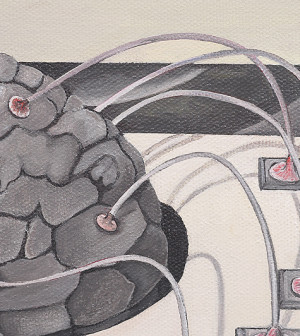- Could Your Grocery Store Meat Be Causing Recurring UTIs?
- Are You Making This Expensive Thermostat Error This Winter?
- Recognizing the Signs of Hypothyroidism
- 10 Strategies to Overcome Insomnia
- Could Artificial Sweeteners Be Aging the Brain Faster?
- Techniques for Soothing Your Nervous System
- Does the Water in Your House Smell Funny? Here’s Why
- Can a Daily Dose of Apple Cider Vinegar Actually Aid Weight Loss?
- 6 Health Beverages That Can Actually Spike Your Blood Sugar
- Treatment Options for Social Anxiety Disorder
Want to Keep an Aging Brain Sharp? Try the Stairs

Aging Americans looking to maintain a healthy brain may want to switch from elevators to stairs, new research suggests.
Fitness seemed key to sharper minds as people got older, a Canadian study found, as was more time spent reading and studying.
The findings show “that education and physical activity affect the difference between a physiological prediction of age and chronological age, and that people can actively do something to help their brains stay young,” said lead investigator Jason Steffener, a scientist at Concordia University in Montreal.
“This is encouraging because it demonstrates that a simple thing like climbing stairs has great potential as an intervention tool to promote brain health,” Steffener said in a university news release.
The researchers used MRI scans to assess the physical brain health of 331 healthy adults, aged 19 to 79. Those who could climb more flights of stairs and those with higher levels of education had “younger” brains, the researchers found.
Specifically, physical brain age was nearly one year lower for each year of education, the study found. For every flight of stairs climbed per day, physical brain age was slightly more than a half year younger, the researchers said.
However, the study only showed an association between these factors and brain health. It wasn’t designed to prove a cause-and-effect relationship.
The study was published recently in the journal Neurobiology of Aging.
Steffener pointed out that there are already many ‘Take the stairs’ campaigns in office environments and public transportation centers. He said this study suggests that these campaigns should also be expanded for older adults to help them work on keeping their brains young.
“In comparison to many other forms of physical activity, taking the stairs is something most older adults can and already do at least once a day, unlike vigorous forms of physical activity,” he said.
More information
The Alzheimer’s Association has more on brain health.
Source: HealthDay
Copyright © 2026 HealthDay. All rights reserved.










